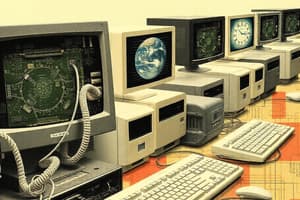Podcast
Questions and Answers
What does the term 'CPU' stand for in computing?
What does the term 'CPU' stand for in computing?
- Computer Processing Unit
- Central Processing Unit (correct)
- Computer Peripheral Unit
- Control Panel Unit
Which type of memory is non-volatile and retains data even when the computer is turned off?
Which type of memory is non-volatile and retains data even when the computer is turned off?
- RAM
- ROM (correct)
- SSD
- HDD
What is a common usage of spreadsheet programs like Excel and OpenOffice Calc?
What is a common usage of spreadsheet programs like Excel and OpenOffice Calc?
- Creating 3D models
- Data analysis and organization (correct)
- Video editing
- Music composition
Which key combination is used to lock a computer quickly?
Which key combination is used to lock a computer quickly?
What do the letters 'LAN' represent in computing?
What do the letters 'LAN' represent in computing?
Which function does the Ctrl + V shortcut key perform?
Which function does the Ctrl + V shortcut key perform?
What is the main function of an operating system?
What is the main function of an operating system?
Which of the following is NOT an example of an operating system?
Which of the following is NOT an example of an operating system?
What does software refer to in the context of computers?
What does software refer to in the context of computers?
Which of the following is a popular spreadsheet software?
Which of the following is a popular spreadsheet software?
What does 'OS' stand for in computing terminology?
What does 'OS' stand for in computing terminology?
Which of the following is a common shortcut key in computing?
Which of the following is a common shortcut key in computing?
Flashcards are hidden until you start studying
Study Notes
Understanding Computers
Computers have become an essential part of our daily lives, whether it's work, communication, entertainment, education, or leisure time activities. Let's delve into understanding some core aspects of computers by exploring their components and their roles in various tasks.
Operating Systems
At the heart of any computer is its operating system (OS), which acts as the primary interface between users and their devices. An OS provides common services for computer programs, such as controlling peripherals like keyboards, providing file management, networking facilities, memory management and more. Examples of popular operating systems today include Microsoft Windows, macOS from Apple Inc., Linux distributions, Chrome OS, and Android. These different OSes cater to various user types, from desktop PCs with advanced functionalities to mobile phones offering convenience for everyday usage.
Software
Software refers to the programs and applications installed on your computer that enable you to perform specific tasks. This could range from word processing, web browsing, video editing, gaming, animation, etc.. Some well-known examples of software include Microsoft Office Suite (Word, Excel, PowerPoint), Adobe Creative Cloud (Photoshop, Illustrator, Premiere Pro), Google Workspace (Google Docs, Sheets, Slides), and Skype for audio calls and conferences.
Hardware
Hardware refers to the physical parts inside a computer that make it function properly. Keyboard, monitor, mouse, speakers, hard drive, CPU - all these fall under 'hardware'. These are what give life to a computer and allow us to interact with them. For example, when we type something on the keyboard, the characters appear on the screen because both input and output devices connect via ports on motherboard's chipset.
Spreadsheet Programs
Spreadsheet programs like Excel and OpenOffice Calc are powerful tools used for data analysis, organization, and presentation. They consist of rows and columns where data can be entered, formatted, calculated, summed up, averaged out, sorted, graphed and displayed visually. They are commonly used across various fields—from finance to marketing, accounting to scientific research—to create tables containing numbers and figures, manipulate data efficiently, generate charts, forecast trends, model scenarios, and handle large amounts of information securely.
Full Forms
Many terms related to computing have abbreviations or acronyms that might sound confusing initially but once understood, they simplify complex concepts. A few full forms relevant to this context are:
- CPU: Central Processing Unit
- GPU: Graphic Processing Unit
- RAM: Random Access Memory
- ROM: Read Only Memory
- SDD: Solid State Drive
- HDD: Hard Disk Drive
- CD/DVD: Compact Disc / Digital Versatile Disc
- USB: Universal Serial Bus
- LAN: Local Area Network
- WAN: Wide Area Network
- ISP: Internet Service Provider
- ASP: Application Service Provider
- GUI: Graphical User Interface
- CAD: Computer Aided Design
- CAM: Computer Aided Manufacturing
These terms represent fundamental elements of computing technology, making it easier to communicate and understand among professionals and enthusiasts alike.
Shortcut Keys
Good command over shortcut keys makes using a computer faster and less prone to RSI (Repetitive Strain Injury). Some useful ones include:
Ctrl + C(Copy)Ctrl + X(Cut)Ctrl + V(Paste)Alt + F4(Close current window)Win+L(Lock computer)Win+E(Open File Explorer)Win+S(Search)Win+Break(System Settings)Win+Tab(Task View)F3(Find Next)Shift+F3(Clear Quick Search)F8 + Arrows(Move cursor around without touching the touchpad)Fn+F10(Mute Mic on Laptops)
Mastering these commands can significantly enhance your productivity while working on a computer.
In summary, understanding the components of computers - operating systems, software, hardware, spreadsheet programs, full forms, and shortcut keys - empowers you to navigate through digital landscapes seamlessly and effectively.
Studying That Suits You
Use AI to generate personalized quizzes and flashcards to suit your learning preferences.




